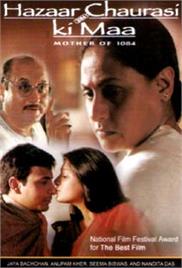Be Careful of Fake Websites. Always use HindiMovies.to domain & Join our Telegram Channel for Latest Updates.

Likes: 6
Views: 2.43K
Dibyanath Chatterji, his bank-employed wife, Sujata, and only child, a son, Brati, live a middle-class existence in Calcutta, West Bengal, India, circa early 1970s. Sujata is a quiet, devout Hindu, religious, and compassionate woman, and Brati has finished his school and is now attending college. His parents are proud of him, and keep track of his progress. Then their world is shattered during the early hours, when they are informed by the police that Brati has been killed. Dibyanath and Sujata go to identify Brati’s body, mourn, lament inconsolably. They know now that their lives will never be the same again – for by the police they will be called the mother and father corpse No. 1084. Sujata struggles to understand Brati’s passing, meets his friends one by one, comes to know that Brati had a girlfriend, Nandini Mitra, and that’s when she finds out that Brati was part of a rebel group often referred to as “Naxalbari”, a militant leftist group. As she delves deeper and deeper into Brati’s former life, she begins to understand her son’s struggle, and decides to continue to further this. What Sujata does not know is her and Dibyanath’s lives are in danger, and they well turn up dead and end up as numbered corpses in a police morgue.
Duration: 186 min
Released: 1998
IMDb Rating: 7.3/10 (206 Votes)
Genre: Drama, Hindi Movies
Stars: Anupam Kher, Milind Gunaji, Jaya Bhaduri, Seema Biswas
Directors: Govind Nihalani
Writers: Mahasweta Devi, Govind Nihalani, Tripurari Sharma
Year: 1998
Server 1 – Videoweed
Server 2 – Dailymotion
Hazaar Chaurasi Ki Maa (1998) is a poignant Hindi drama film that delves deep into the emotional and socio-political turbulence experienced by a mother who loses her son to the harsh realities of political activism. Directed by renowned filmmaker Govind Nihalani and penned by acclaimed writer Mahasweta Devi, the film is a gripping adaptation of Mahasweta Devi's novel of the same name. It intricately explores themes of loss, rebellion, and awakening, making it a thought-provoking cinematic experience.
Plot Summary
The narrative centers on Sujata Chakraborty, brilliantly portrayed by Jaya Bachchan, a middle-class mother living a peaceful life with her family. However, this tranquility is shattered when she learns about the death of her son, Brati, who was involved in leftist extremist movements in India. Shocked and devastated, Sujata embarks on a journey to uncover the reality behind Brati's militant involvement and his untimely death on the 1084 street address, which metaphorically symbolizes the political unrest and extremism of that time.
As Sujata digs deeper, she confronts uncomfortable truths about her son's ideologies, the socio-political environment that shaped his activism, and the oppressive state machinery suppressing dissent. The film portrays Sujata's transformation from a grieving mother to a socially aware individual trying to make sense of the turmoil surrounding her son's life and death. The story is an eloquent portrayal of a mother's love intertwined with political awakening, reflecting the larger context of unrest in India during the 1970s.
Main Cast and Performances
Direction and Writing
Govind Nihalani, known for his socially relevant themes and realistic filmmaking style, directs Hazaar Chaurasi Ki Maa with a keen eye for detail and emotional gravity. His direction creates an atmosphere that is both intimate and universally relatable. Nihalani's ability to balance political narrative with personal tragedy allows the film to maintain its emotional core while addressing broader societal issues.
The screenplay, adapted by Govind Nihalani himself, faithfully follows Mahasweta Devi’s original novel. Mahasweta Devi’s writing is renowned for its raw portrayal of marginalized voices and political dissent. The screenplay enhances these elements, emotively translating the book's themes of activism, state oppression, and maternal grief onto the screen.
Music and Songs
Unlike many Bollywood films, Hazaar Chaurasi Ki Maa does not emphasize songs as a centerpiece of its narrative. Staying true to its dramatic and serious tone, the film uses minimalistic background scores to underline the emotional and tense moments rather than typical Bollywood-style song and dance sequences. This choice adds to the realism and rawness of the storytelling, focusing audience attention on the narrative rather than musical interludes.
Critical Reception and Legacy
Hazaar Chaurasi Ki Maa received widespread acclaim for its socially conscious storytelling and powerful performances, particularly by Jaya Bachchan. The film is commended for bringing to light the complex emotions involved in political insurgency and personal loss.
The movie stands as a significant cinematic work that confronts difficult issues with sensitivity and intellectual depth. It is celebrated in both Bollywood and art-house circles for its thematic courage and its nuanced portrayal of a mother's journey through grief and realization against a politically charged backdrop.
Conclusion
Hazaar Chaurasi Ki Maa is a compelling drama that transcends a simple story of loss. It offers an evocative insight into the socio-political struggles of India during a turbulent period, seen through the eyes of a mother who tragically loses her son to political extremism. Anchored by powerful performances, especially by Jaya Bachchan, and guided by Govind Nihalani’s sensitive direction, the film remains a profound narrative on the impact of political activism on personal lives.